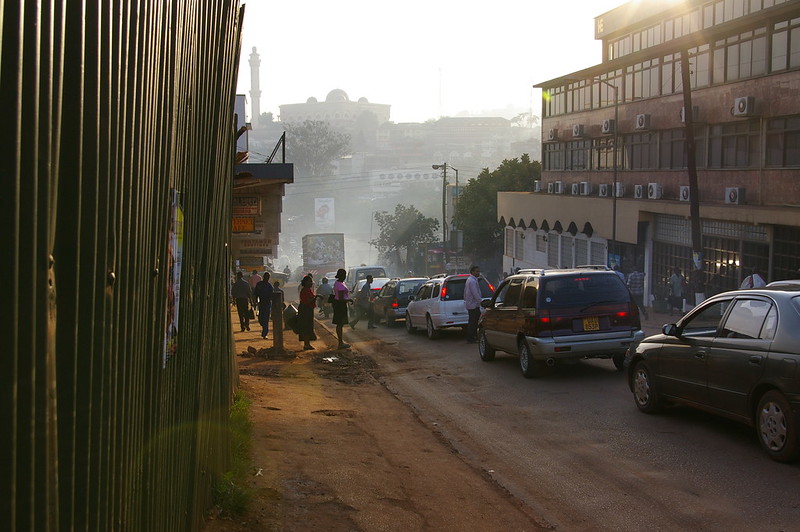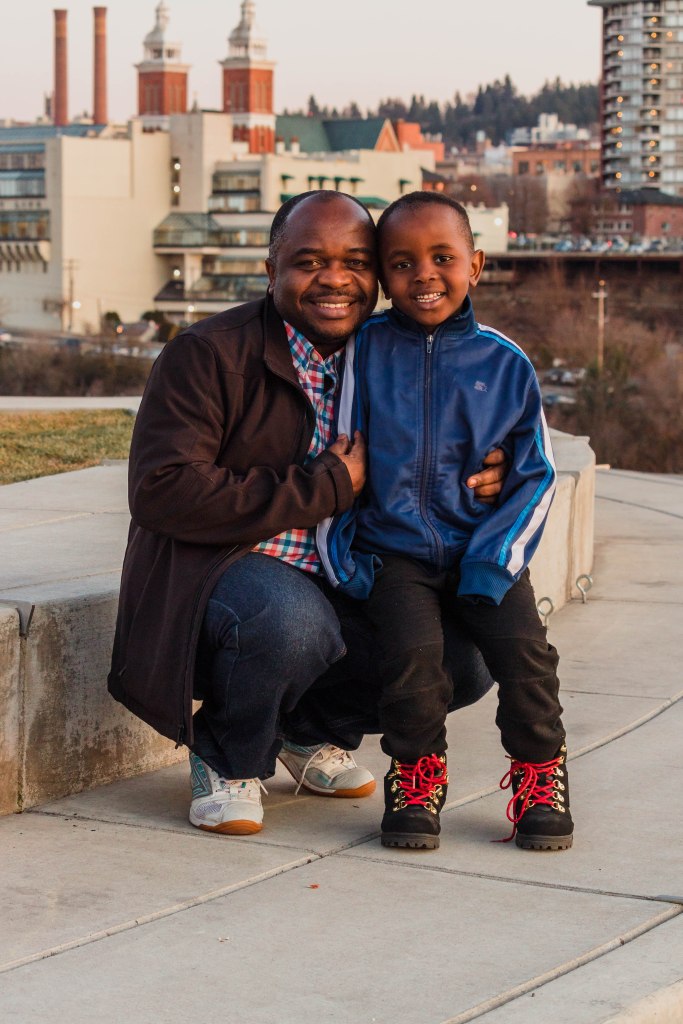How Justin Kalumuna survived a military attack, brought his family to safety and rebuilt his life in the U.S.
Part I: Escaping Violence in the DRC
When Justin Kalumuna left for work one morning in 2011, he wasn’t expecting that day to be the first in his 7-year journey as a refugee.
It was on that day that Justin accepted a new passenger and drove him to an unfamiliar place called Rutshuru. For Justin, a seasoned taxi driver, to be unfamiliar with any area was both a rarity and a red flag. When the man returned, Justin realized he was a soldier.
For nearly 23 years, the Rwandan militia had been terrorizing eastern Congo. As a matter of principle and safety, Justin decided not to drive him again or even to answer his calls. The soldier took this as a personal offense.
“All the time he would call me, I would not like to accept his call or maybe to hire [out] my taxi again,” Justin said. “And he was like, ‘no way.’ So it creates a kind of problem.”
One evening, the soldier showed up at Justin’s house with some fellow soldiers. They kicked down the door of Justin’s house, but found only Justin’s wife, Justine, and their three children.
Justin was at church. A neighbor called to say there was shouting coming from his yard in Lingala, the region’s military language. Justin left the service, hurriedly crossing the short distance between his church and home. A military-grade flashlight flickered to life in his face, and he froze.
“They knocked me down. They started hitting me. I lose the control and they were hitting me with something in my back. I don’t know what was it, but I lost the conscious,” he said.
A U.N. Peacekeeping vehicle on patrol happened to pass by the scene. The soldiers scattered and the vehicle’s high beams illuminated Justin as he lay on the ground, unconscious. Next thing he remembered, Justin woke up in a hospital bed.
“I saw the clothes that looked like hers, and the person was almost her, but she was not looking at me,” he said. “I end up realizing that she’s my wife on the next bed. She was beaten, and she lose conscious and the neighbor took her to the hospital.”
The doctor was as surprised as they were when she learned these two patients in neighboring beds were married. It turned out to be a life-saving realization only moments later when three soldiers appeared at the hospital looking for Justin.
“When the soldiers left me they see I am like died. So they get to hear that I didn’t die, and they came looking for me in the hospital,” he said.
The attackers searched every room. The doctor hid Justin and Justine in a supply closet as the soldiers combed through the hundreds of hospital beds looking for their victims. Justin and Justine were able to escape through the hospital’s back door, run to the neighbor’s house to get the children and flee to Congo’s eastern border. On market day, the family crossed into Uganda.

Part II: Life as an Urban Refugee
Once they crossed the border, Justin wasn’t sure what to do next. His only connection in Uganda was a phone number belonging to Emmanuel Bakenga, an old friend with whom he hadn’t spoken in years.
“I tried that number. It was so long since I didn’t talk to him, but I had the number, and the number went through,” Justin said.
Much to Justin’s surprise, Emmanuel not only picked up the phone, but also arranged transportation for all five Kalumunas to join him in Kampala, Uganda’s capital city.
Justin said his life was changed as a result of Pastor Emmanuel’s hospitality. For three months Emmanuel hosted all five Kalumunas, providing for their every need while Justin and Justine nursed their wounds. The Kalumunas also became active members in Emmanuel’s congregation.
“You can work for five years and leave with one friend. Preaching once can give me ten good friends that are more than brothers,” he said.
During their first few months in Uganda, Justin was sorting out the family’s legal status. They had arrived in Uganda as asylum seekers. They were then granted status as urban refugees, a title that means you can live as a resident in a city, instead of a camp. This provides refugees with the autonomy to make money and build a better future.
“Remember, I have a wife and I have also three kids. I have also to start working and learning English, so it was a very harshened life,” he said.
During those next few months in Kampala, Justin sold jewelry. He says people in Uganda like to buy jewelry from the Congolese people, because they think it’s more authentic. At that time, Justin had also enrolled himself in English classes at Jesuit Refugee Service (JRS), eventually learning enough to enroll at Makerere University. He also applied for a highly-sought after position as an interpreter for the UNHCR.
Justin recalls that the initial applicant pool for this position was 96. , was 96. After some written tests, only 30 applicants were left, and following the first interview, there were only 10.
“So I went there for the second interview and I found that people were from the office of the Prime Minister, who was in charge of refugees, and UNHCR staff was also there,” he said. “The NGO who was in charge of all interpreters was all there. There were like seven people, and these are really high-ranked people.”
To say Justin was ecstatic after receiving the job offer would be a severe understatement. It was a great honor, he says, to have been selected from nearly 100 applicants, but it was an even greater honor to serve others in vulnerable situations like his own.
“I knew like people life, what they got through, the struggle,” he said. “You know, me myself, I’m a refugee. I live with people in this community. I understand people.”
Two big things happened next: First, after waiting more than a year, the Kalumunas finally made an appointment for their immigration interview. Second, they welcomed a little one to the family: Chubaka Emmanuel, born December 24.
Amidst the excitement of a new son, Justin was faced with a difficult choice. Emmanuel, the newest Kalumuna, would start his refugee application at step zero. The rest of the family would have to start the process over from the beginning if they wanted to stay together.
It is fairly common for refugee families faced with the same choice to let one family member, usually the father, proceed with resettlement. That way, someone can go get a job, a house, and set up life for the rest of the family when they arrive. But for Justin, the choice to stay together was easy, and having a steady job meant his family could wait a little longer. Not every refugee has that option.
One year later, the Kalumunas had completed and resubmitted their resettlement application, this time as a family of six. They waited through another year for news of resettlement. But in early 2017, the White House issued Executive Order No. 13769, which barred immigration from six countries entirely and halted nearly every refugee case up for resettlement in the U.S. Justin felt like he’d just been sent back to square one.
After that, life in Uganda resumed its normal march: Justin and Justine kept working, the kids continued to attend school. Justin even put a down payment on a car — he was settling in to the idea of life in Uganda.
And then, out of nowhere, the U.S. resettlement list came.

Part III: Life in America as a Former Refugee
Justin still remembers this part play-by-play: It was February 2018. He had just returned from lunch (the same day he bought the car) and went to get some papers off the printer for his boss.
He looked at the papers Justin had just handed him, and found it was the U.S. immigration interview list. Justin casually read the list over his boss’s shoulder. He looked closer and realized Justine’s name was there too, and so were Joyce, Prince, Merveile and Emmanuel’s.
This image has an empty alt attribute; its file name is kalamuna-13.jpg
“Immediately, I felt like all my mind changing and my future changing and everything changing in my mind. Millions of pages was running in my mind, like seeing myself in the United States. And it was a great hope, you know,” he said.
When Justine heard the news, she literally didn’t believe it, and made Justin swear he saw their names with his own eyes.
After that, things went quickly. In March, the Kalumunas met with immigration to prepare their case files. In April, they did the immigration interview. In June, each family member completed the medical examination and security check (for the third time) and in August, the visas arrived.
On the 20th of September, the Kalumunas were on a plane bound for Spokane. When they landed, World Relief staffers were there to greet them. A volunteer family in Coeur D’Alene opened their home, and to this day, Justin considers those first American friends to be as close as family.
From there, Justin and Justine began to settle in. They moved to Spokane and lived with a friend they met in Uganda, Daniel Casigua, who was the secretary at Pastor Emmanuel’s church. After that, they moved into a new apartment, enrolled the kids in school and started to look for work.
Like all new arrivals, Justin and Justine were given the choice to enroll in social services through DSHS or in a program for those ready to work immediately, called Match Grant.
Justin remembers their decision hinging on the long-term guidance that Match Grant offers.
“We just need someone who can connect us with the small things,” Justin said. “We are ready to fly ourselves — me and my wife, we have that confidence and we were ready to fly. So we signed [up for] Match Grant.”
After that, Justin and Justine took off in pursuit of the American dream.
Their first job was with Davenport Hotels. Justin took the housekeeping night shift so that Justine could work mornings. They took opposite shifts taking care of their kids, and Justin remembers quality sleep was rare in that time.
Only a few months into his position, Justin earned a promotion as the night shift assistant supervisor. After seven months with the Davenport on their crazy, sleepless schedule, Justin applied for a job as a living assistant.
He is now a Certified Nursing Assistant (CNA), and is working on becoming a registered nurse; Justine still works for Davenport Hotels. They are currently in the process of buying a house and they own several vehicles, which Justin noted are all paid off. Justin pastors Living Sacrifice Christian Ministries, which just moved into a new building. He loves being able to serve the Spokane community with his church ministry, and is grateful that God has trusted so many friendships to him.
Katherine Bell | 3/9/2020

